|
|
|
Sort Order |
|
|
|
Items / Page
|
|
|
|
|
|
|
| Srl | Item |
| 1 |
ID:
110641
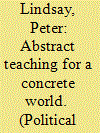

|
|
|
|
|
| Publication |
2011.
|
| Summary/Abstract |
This article argues that instructors should introduce students to abstract concepts only after they have provided concrete illustrations of them. The advantages of working from the concrete to the abstract are twofold: (1) students have an easier time conceptualizing abstractions from within a particular context, and (2) such a context provides them with a greater motivation to do so. In an effort to mirror the pedagogical approach I defend, I begin by reviewing the manner in which Plato introduces the concept of justice to his readers in Book I of the Republic. I then examine the common model of teaching abstract concepts, demonstrate how an effective alternative differs from this model, and review the education theories that support the alternative model.
|
|
|
|
|
|
|
|
|
|
|
|
|
|
|
|
| 2 |
ID:
110647


|
|
|
|
|
| Publication |
2011.
|
| Summary/Abstract |
This article describes a local government budgeting simulation developed by the author and used in an undergraduate course on the politics and administration of local government budgets. The exercise allowed students to participate in a simulated budget process that provided them with firsthand experience in allocating scarce resources, making collective decisions, and considering the political implications of budget alternatives. The simulation activities also provided students with opportunities to practice their written and oral communication skills, as well as experience in developing arguments to support particular revenue or spending proposals.
|
|
|
|
|
|
|
|
|
|
|
|
|
|
|
|
| 3 |
ID:
110648
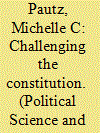

|
|
|
|
|
| Publication |
2011.
|
| Summary/Abstract |
Simulations are useful tools in the classroom for an assortment of pedagogical reasons. I have devised a mock constitutional convention for use in introductory American government courses to better engage students and spur critical thinking about the U.S. Constitution. This article details the particulars of the simulation and its outcomes.
|
|
|
|
|
|
|
|
|
|
|
|
|
|
|
|
| 4 |
ID:
110639


|
|
|
|
|
| Publication |
2011.
|
| Summary/Abstract |
We critique the typical use of visual aids at political science conferences and make suggestions about more effective ways to incorporate them into presentations. Our main suggestions are that political scientists should use fewer and simpler slides, and that those slides should contain visually rich information that illustrates a speaker's point without distracting the audience from his or her words.
|
|
|
|
|
|
|
|
|
|
|
|
|
|
|
|
| 5 |
ID:
110633


|
|
|
|
|
| Publication |
2011.
|
| Summary/Abstract |
The purpose of this article is to examine the potential impact of Hispanics on the electoral geography of the southern United States after the 2010 decennial census. Hispanics are the largest and fastest-growing minority group in the United States today. In addition to traditional Hispanic destinations such as Florida and Texas, many of the areas experiencing the most rapid growth in Hispanic population are southern states such as Georgia, North Carolina, and Virginia. Geographic information systems are used to determine where majority-minority and influential districts are likely to emerge in southern states. We argue that although the Latino population has increased significantly over the past decade, the proportion of Latinos living in southern states remains relatively low in comparison to the general population. Therefore, no new majority-minority or influence districts will emerge in Louisiana, Mississippi, or Tennessee. Majority-minority and influence districts are likely to emerge in Arkansas, Georgia, North Carolina, South Carolina, and Virginia at the state and local levels, but not at the U.S. congressional level. Texas and Florida are the only southern states where new majority-minority and influence districts are likely to emerge at the U.S., state, and local levels after the 2010 decennial census.
|
|
|
|
|
|
|
|
|
|
|
|
|
|
|
|
| 6 |
ID:
110625


|
|
|
|
|
| Publication |
2011.
|
| Summary/Abstract |
My talk honors the contribution of Ithiel de Sola Pool to empirical political theory, a field pioneered by Pool, David Easton, and Gabriel Almond, inter alia. Pool's 1967 edited volume, Contemporary Political Science: Toward Empirical Theory illustrates some of the important early works in this field, a field designed to generate political theory from the systematic examination of empirical data. To demonstrate the kind of work Pool developed, I begin my talk by suggesting what studying altruism and genocide taught me about broader themes in political, social, and moral theory. I then suggest how I developed a new theory of moral choice in order to explain the surprising finding that identity trumped choice for all the participants I interviewed about their actions during the Holocaust and World War II, from Nazis and bystanders to rescuers of Jews. This paper thus summarizes the highlights of the 2010 Pool Lecture to provide a few illustrations of the empirical findings that led me to develop an identity-based theory of moral choice.
|
|
|
|
|
|
|
|
|
|
|
|
|
|
|
|
| 7 |
ID:
110626


|
|
|
|
|
| Publication |
2011.
|
| Summary/Abstract |
In 2011, the Fulbright Scholar Program celebrates its 65th anniversary as America's preeminent international educational exchange program. In recognition of its international impact, this is a timely occasion to recall the program's history and note the roles of political scientists who have taught and conducted research around the globe as Fulbright Scholars.
|
|
|
|
|
|
|
|
|
|
|
|
|
|
|
|
| 8 |
ID:
110632
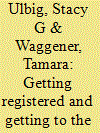

|
|
|
|
|
| Publication |
2011.
|
| Summary/Abstract |
Each election year, colleges and universities across the nation witness a plethora of on-campus voter registration activities. The results of these drives are most often assessed by tallying the number of voter registration cards collected. Little has been done, however, to more carefully investigate these results. As a first attempt to examine postdrive results more thoroughly, we ask two questions. First, do students who register through an on-campus voter registration drive actually make it to the voting booth? Second, does providing basic information about the voting process increase turnout among students who register through an on-campus voter registration drive? In this study, we investigate the overall turnout rate of students registering to vote in the 2008 presidential election through on-campus registration drives by validating votes through the office of the county voting registrar. We then compare the turnout rate of students who registered through the on-campus drives with the turnout rate of similar young people nationwide. Finally, we investigate whether the provision of information through certain avenues boosts turnout. Our findings show that students who registered through an on-campus voter registration drive turned out to vote at a higher rate than similar young people nationwide. Additionally, we found small but important effects of information provision through different formats.
|
|
|
|
|
|
|
|
|
|
|
|
|
|
|
|
| 9 |
ID:
110628


|
|
|
|
|
| Publication |
2011.
|
| Summary/Abstract |
We propose an experimental design particularly adapted to the study of individual behavior in collective action situations. The experimental protocol improves on the artificiality that is commonly present in lab and survey experiments to achieve a closer replication of the real-life conditions of such decisions while avoiding the high costs associated with field experiments. We exemplify this design by means of a study on strategic voting in elections.
|
|
|
|
|
|
|
|
|
|
|
|
|
|
|
|
| 10 |
ID:
110640


|
|
|
|
|
| Publication |
2011.
|
| Summary/Abstract |
There may be no greater concern in political science than the state of the job market. Particularly for newly minted Ph.D.s, the number and type of jobs available and their possibility of success on the market are sources of great anxiety. Similarly, department chairs, graduate directors, and dissertation chairs struggle as they make choices about recruiting faculty and students and determine how to advise their students as they progress toward their degrees. These concerns are common in most years, but they have been especially salient in the last several years, when the economic downturn has affected nearly every aspect of higher education. The purpose of this report is to present data that will assist faculty and students in navigating the political science employment landscape.
|
|
|
|
|
|
|
|
|
|
|
|
|
|
|
|
| 11 |
ID:
110642


|
|
|
|
|
| Publication |
2011.
|
| Summary/Abstract |
This article addresses the pedagogical value of teaching Aristotle's Politics 4.1 early in an introductory course in political theory that draws texts from the history of political thought. I argue that this chapter provides an interpretive key to understanding arguments made elsewhere in the Politics and can be used to introduce students to the kinds of theorizing that appear in the study of politics more generally. I begin by laying out some common learning obstacles that students experience in introductory political theory courses, using Politics 4.1 to address these issues. I then outline my approach to this text and conclude by reflecting on some of the possibilities and limitations of this method of introducing the nature of political theory to an undergraduate population.
|
|
|
|
|
|
|
|
|
|
|
|
|
|
|
|
| 12 |
ID:
110637
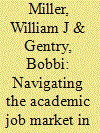

|
|
|
|
|
| Publication |
2011.
|
| Summary/Abstract |
Doctoral programs take great care in assuring that students are prepared to enter the job market and become effective teachers and researchers. However, once faced with the daunting task of landing their first position, students are oftentimes left on their own. Given the current state of the job market-more applicants for fewer jobs-it is essential that students understand the process and what they should expect as they work to receive their first academic position. In this article, we walk students through the hiring process from deciding which jobs to apply for to handling contract negotiations.
|
|
|
|
|
|
|
|
|
|
|
|
|
|
|
|
| 13 |
ID:
110645


|
|
|
|
|
| Publication |
2011.
|
| Summary/Abstract |
Many political science publications advance knowledge using previously collected data and an innovation or two in theory or methods. To encourage students embarking on a seminar paper project, I review some of these publications to illustrate that the understanding of political phenomena often advances in incremental steps.
|
|
|
|
|
|
|
|
|
|
|
|
|
|
|
|
| 14 |
ID:
110646


|
|
|
|
|
| Publication |
2011.
|
| Summary/Abstract |
In this article, I describe my work with Michigan State University undergraduates to produce the Michigan Policy Network, a web-based public service and research program that reports news and information about the political process surrounding Michigan state policy issues. The program empowers undergraduates to oversee website sections devoted to policy issue areas, each of which features background information, research, and current updates on government action, as well as regular blog posts, that aim to make the information accessible to a public audience. I explain how to inexpensively set up such a program and reflect on the strengths and weaknesses of the approach. I evaluate the four different methods that I have used to integrate the policy network with traditional teaching: (1) working with students as an extracurricular activity, (2) organizing a summer program for government interns acting as researchers, (3) integrating network assignments with traditional homework in topical classes, and (4) teaching a separate class for freshman honors students. My experience suggests that students are motivated to complete work intended for a public audience and are well-equipped to translate government information for public readers. Working on the policy network improves student employment prospects and helps build connections between state government and the university. I recommend that similar programs be developed elsewhere.
|
|
|
|
|
|
|
|
|
|
|
|
|
|
|
|
| 15 |
ID:
110635


|
|
|
|
|
| Publication |
2011.
|
| Summary/Abstract |
This article addresses Andrew Rehfeld's attempt to ensure a place for political theory within political science, which he does partly by showing how political theory fits into a defensible definition of political science and partly by excluding much political theory from the discipline in order to safeguard the rest. His account of what the discipline should comprehend is overly narrow, however, and does not serve the interests of the sorts of political theory he strongly believes are worth doing. I argue instead that political science must be defined by its subject matter alone, and that political theory's contribution to this subject matter must be defended.
|
|
|
|
|
|
|
|
|
|
|
|
|
|
|
|
| 16 |
ID:
110630


|
|
|
|
|
| Publication |
2011.
|
| Summary/Abstract |
This article demonstrates that racial prejudice was strongly related to the state-level nonblack vote in the 2008 presidential election, which featured the first African American candidate from a major party, Barack Obama. Additional tests show that while prejudice also explains shifts in the nonblack vote between 2004 and 2008, its influence on voting in the 2000 and 2004 elections was modest at best. Furthermore, there is no relationship between racial attitudes and state-level presidential approval of George Bush in 2008. Taken together, the findings suggest that prejudice does not have a pervasive influence on political behavior and opinion. Instead, the effect appears to have been triggered by the presence of Barack Obama on the ballot. Had there been less prejudice among the American voting public, Obama would likely have won an electoral vote landslide.
|
|
|
|
|
|
|
|
|
|
|
|
|
|
|
|
| 17 |
ID:
110634
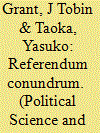

|
|
|
|
|
| Publication |
2011.
|
| Summary/Abstract |
Scholars often use referenda as the plural for referendum. This choice is a hypercorrection-it may sound like proper Latin, but it is not. Referendums is always the correct choice. However, we maintain that there is value in using referendums for multiple events and referenda for multiple propositions.
|
|
|
|
|
|
|
|
|
|
|
|
|
|
|
|
| 18 |
ID:
110627
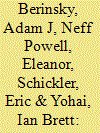

|
|
|
|
|
| Publication |
2011.
|
| Summary/Abstract |
Studies of mass political attitudes and behavior before the 1950s have been limited by a lack of high-quality, individual-level data. Fortunately, data from public opinion polls conducted during the late New Deal and World War II periods are available, although the many difficulties of working with these data have left them largely untouched for over 60 years. We compiled and produced readily usable computer files for over 400 public opinion polls undertaken between 1936 and 1945 by the four major survey organizations active during that period. We also developed a series of weights to ameliorate the problems introduced by the quota-sampling procedures employed at the time. The corrected data files and weights were released in May 2011. In this article, we briefly discuss the data and weighting procedures and then present selected time series determined using questions that were repeated on 10 or more surveys. The time series provide considerable leverage for understanding the dynamics of public opinion in one of the most volatile-and pivotal-eras in American history.
|
|
|
|
|
|
|
|
|
|
|
|
|
|
|
|
| 19 |
ID:
110636


|
|
|
|
|
| Publication |
2011.
|
| Summary/Abstract |
This article investigates the variables that affect the award of tenure in political science departments in the United States. We examined two dependent variables: (1) whether a department has denied tenure in the past five years, and (2) whether a positive departmental tenure recommendation has been reversed by higher college or university authorities during the same period of time. Five clusters of independent variables were evaluated: (1) college/university and departmental characteristics, (2) the procedures employed to evaluate tenure cases, (3) the instruments used to assess teaching, (4) service expectations, and (5) research and publication standards. We found that the most important factors affecting departmental decisions to deny tenure were whether teaching and substantive publications were treated as equally valuable qualifications, the number of articles a candidate published, and the candidate's level of commitment to advising. Interestingly, reversal decisions by higher authorities were not strongly affected by any of the variables in the analysis.
|
|
|
|
|
|
|
|
|
|
|
|
|
|
|
|
| 20 |
ID:
110643


|
|
|
|
|
| Publication |
2011.
|
| Summary/Abstract |
We propose that teaching critical thinking is the most important job of teachers in the political science profession. Yet political scientists rarely engage with one another about the specific assignments used to teach critical thinking. This article is the beginning of what we hope will become a dialogue on how to best teach students to think critically. We make a few recommendations for assignments that aim to make students think critically within the various political science methodologies: normative, interpretive, causal, and comparative analysis. We argue for a particular strategy in teaching critical thinking that reinforces students' abilities to recognize which kinds of arguments require which kinds of evidence.
|
|
|
|
|
|
|
|
|
|
|
|
|
|
|
|
|
|
|
|
|